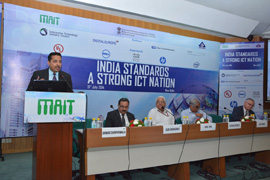– Industry appreciates government’s move towards tackling counterfeit and substandard products
– Market surveillance of products necessary to ensure quality control
 New Delhi, July 31, 2014: With the growing consumption of electronic products, the Indian ICT industry is also gradually increasing. India is expected to consume USD 320 billion worth of ICT products annually by 2020. Government has initiated the creation of an appropriate policy ecosystem to ensure that consumers get access to safe and good quality technology products. Keeping this in mind government had notified the Electronics and Information Technology Goods (Requirement for compulsory Registration Order) in 2012. Though the intent of order is well appreciated by all stakeholders, there are increasing calls for harmonization of requirements under the order with globally accepted best practices. Given this context MAIT, the apex body representing India’s IT hardware, training and R&D services sectors, in association with the Department of Electronics & Information Technology (DeitY) and Bureau of Indian Standards (BIS) organized a one-day programme titled “India Standards: A strong ICT Nation”.
New Delhi, July 31, 2014: With the growing consumption of electronic products, the Indian ICT industry is also gradually increasing. India is expected to consume USD 320 billion worth of ICT products annually by 2020. Government has initiated the creation of an appropriate policy ecosystem to ensure that consumers get access to safe and good quality technology products. Keeping this in mind government had notified the Electronics and Information Technology Goods (Requirement for compulsory Registration Order) in 2012. Though the intent of order is well appreciated by all stakeholders, there are increasing calls for harmonization of requirements under the order with globally accepted best practices. Given this context MAIT, the apex body representing India’s IT hardware, training and R&D services sectors, in association with the Department of Electronics & Information Technology (DeitY) and Bureau of Indian Standards (BIS) organized a one-day programme titled “India Standards: A strong ICT Nation”.
Speaking during the workshop, Amar Babu, President, MAIT said “Standards are important for matters relating to consumer safety and product quality. Implementation of standards framework and its compliance is extremely essential as it will eventually determine the success of the entire process. MAIT will take forward a proposal on behalf of the ICT industry, basis the feedback received from the programme and share it with the government. The proposal shall encourage the participation of industry players to come forward and share best practices relating to standards from across the globe“.
The program succeeded in creating awareness about internationally accepted best practices for ICT standards. It acted as platform for both the Officials from DeitY and BIS and Industry honchos to deliberate and dwell upon the processes and mechanisms involved in the development and implementation of ICT standards.
While addressing the Seminar, Dr. Ajay Kumar, Joint Secretary, DeitY said “The Compulsory Registration Order, notified by DeitY has ensured registration of products by the manufacturers, both domestic and foreign, thereby curbing inflow of sub-standard goods. Special measures have been initiated to provide financial assistance to MSMEs and reducing compliance effort with simpler and effective labeling, reduced timelines and greater transparency”.
The programme was well attended by delegates from the domestic industry as well as several international organisations such as Information Technology Council, Digital Europe, Taipei Computer Association and SESEI.
Welcoming the attendees, Anwar Shirpurwala, Executive Director, MAIT said “MAIT, as an industry body understands the importance of having standards for electronic goods as it is essential to prevent inflow of sub-standard goods in the market. The Indian government too has been taking positive steps to safeguard the interests of consumers through compulsory registration order which will go a long way in promoting quality and dependability across the ICT industry”.
Present during the seminar Keshav Desiraju, Secretary, Ministry of Consumer Affairs said “Self registration, as implied by the CRO, is an enormous responsibility in itself. All inclusive growth of the ICT sector depends upon voluntary registration of products and how best we can take this forward. Consumers will be the end beneficiary of the process as standard of products will improve once the registration order is implemented fully”.
The day long program was divided into four sessions namely, “Role of Standards in the ICT & Electronics Sector – Trends, Opportunities and Issues,”“Compulsory Registration Order – Experience and way forward,”“Market Surveillance, Quality Control and Inspection,”“Anti-Counterfeiting and Consumer Awareness.”






